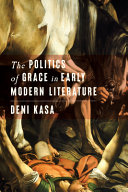The Politics of Grace in Early Modern Literature
This book tells the story of how early modern poets used the theological concept of grace to reimagine their political communities. The Protestant belief that salvation was due to sola gratia, or grace alone, was originally meant to inspire religious reform. But, as Deni Kasa shows, poets of the period used grace to interrogate the most important political problems of their time, from empire and gender to civil war and poetic authority. Kasa examines how four writers--John Milton, Edmund Spenser, Aemilia Lanyer, and Abraham Cowley--used the promise of grace to develop idealized imagined communities, and not always egalitarian ones. Kasa analyzes the uses of grace to make new space for individual and collective agency in the period, but also to validate domination and inequality, with poets and the educated elite inserted as mediators between the gift of grace and the rest of the people. Offering a literary history of politics in a pre-secular age, Kasa shows that early modern poets mapped salvation onto the most important conflicts of their time in ways missed by literary critics and historians of political thought. Grace, Kasa demonstrates, was an important means of expression and a way to imagine impossible political ideals.
Looking for a high-quality, original digital edition of
The Politics of Grace in Early Modern Literature
? This official electronic version is published by
Stanford University Press
and offers a seamless reading experience, perfect for professionals, students, and enthusiasts in
Literature.
Unlike EPUB files, this is the authentic digital edition with complete formatting, images, and original content as intended by the author .
Enjoy the convenience of digital reading without compromising on quality. Order The Politics of Grace in Early Modern Literature today and get instant access to this essential book!












0 Comments